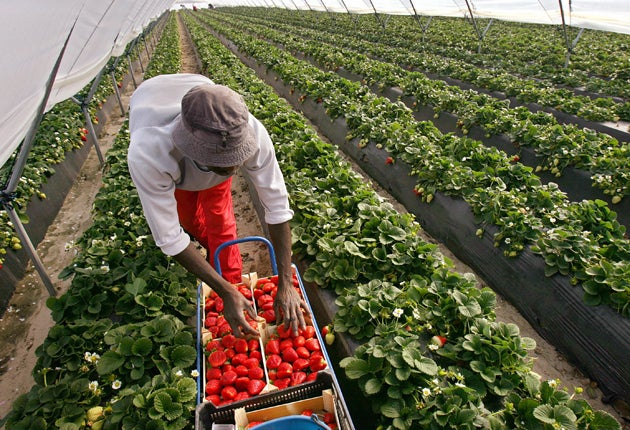If you want to go green, buy Spanish strawberries
The belief that local is best when it comes to measuring the environmental impact of our food is often wrong, says new research

Millions of Britons who think they are doing their bit for the environment by choosing home-grown food over produce imported from thousands of miles away could actually be having the reverse effect, according to a startling new report.
The "food miles" philosophy that decrees anything transported over distance is worse for the environment than something closer to home is frequently flawed, according to researchers funded by the Department for Environment, Food and Rural Affairs (Defra).
The reality is more complex: while some foods may well be better on grounds of transport alone, they may be less kind to the environment when it comes to the amount of energy used in producing them.
Next time they are at the supermarket, green enthusiasts may want to think twice before opting for British strawberries and tomatoes over those grown in Spain. British-grown varieties fare badly compared with Spanish imports in terms of energy use and global-warming potential. Much more energy is needed to heat greenhouses here – not an issue in sunny Spain – so there is a trade-off between the increased use of gas and electricity, and the longer transport distance and greater demands on water in Spain.
And if transport is taken out of the equation, lamb from New Zealand is a more sustainable choice than that farmed in Britain – with less energy used for farming in a climate where there is less need for feed supplements and heated farm buildings.
"The global-warming potential arising from production of tomatoes and strawberries in Spain, poultry in Brazil and lamb in New Zealand remained less than from those foods produced in the UK despite the greenhouse gas emissions that took place during transport," says the Comparative Life Cycle Assessment of Food Commodities report.
If Britons want to continue to have a choice of food all year round, it may be better to import some staples and avoid the emissions otherwise caused by keeping British produce in chilled storage for long periods, according to researchers.
Dr Adrian Williams, an agriculture expert from Cranfield University and one of the report's authors, said: "There's no question that foreign-produced food can have a lower footprint than British-produced food. Home-production is by no means the answer to minimising the environmental impacts of food." He added: "It is ironic that people could be buying certain things with the best of intentions but actually making a poorer environmental choice."
Perhaps unsurprisingly, given the findings, the report has not been released to the media, and only recently surfaced on an obscure part of Defra's research website. It is the result of a two-year study into the environmental impacts of New Zealand-produced apples and lamb, beef and poultry from Brazil, potatoes from Israel, and strawberries and tomatoes from Spain, versus British varieties.
Although chicken imported from Brazil loses out when it comes to emissions through transport, it is better in terms of the energy used to farm it. And even the greenhouse gas emissions are lower, because the electricity comes mainly from renewable sources. Similar things apply to beef from Brazil, although it is worse in terms of land use compared with cattle farmed in Britain.
But there's little confusion over potatoes from Israel and apples from New Zealand – both are worse for the environment than home-grown varieties on just about every measure used.
Jeanette Longfield, co-ordinator of the food and farming pressure group Sustain, said: "My worry is that people will throw the baby out with the bathwater, and say we thought local was better and now it's not. It is complicated, and it's the job of government and industry to plough through the complexity to ensure that we don't have unsustainable products in our shops, irrespective of where they happen to come from."
In an attempt to reduce emissions from food production, Defra will publish Britain's first draft sustainability indicators for food, as part of a wider package on food policy, later this year.
Join our commenting forum
Join thought-provoking conversations, follow other Independent readers and see their replies
Comments
Bookmark popover
Removed from bookmarks